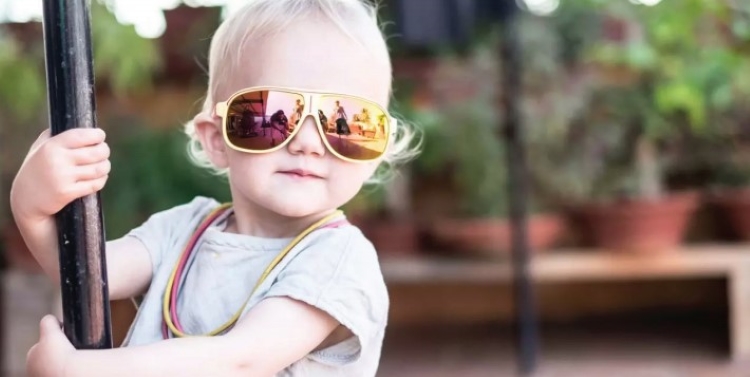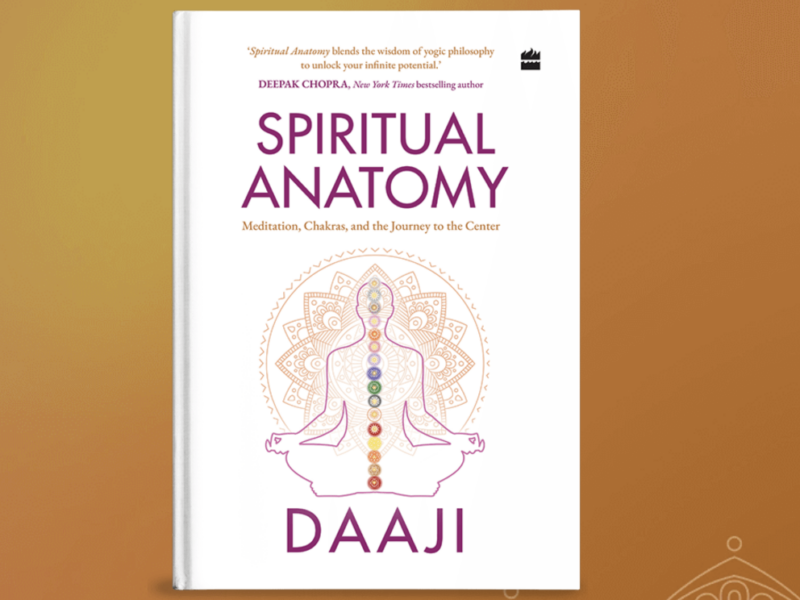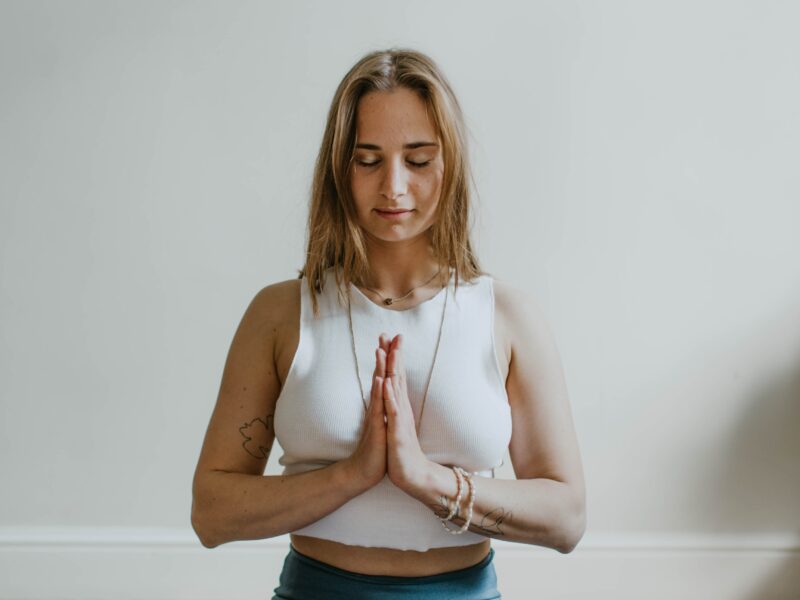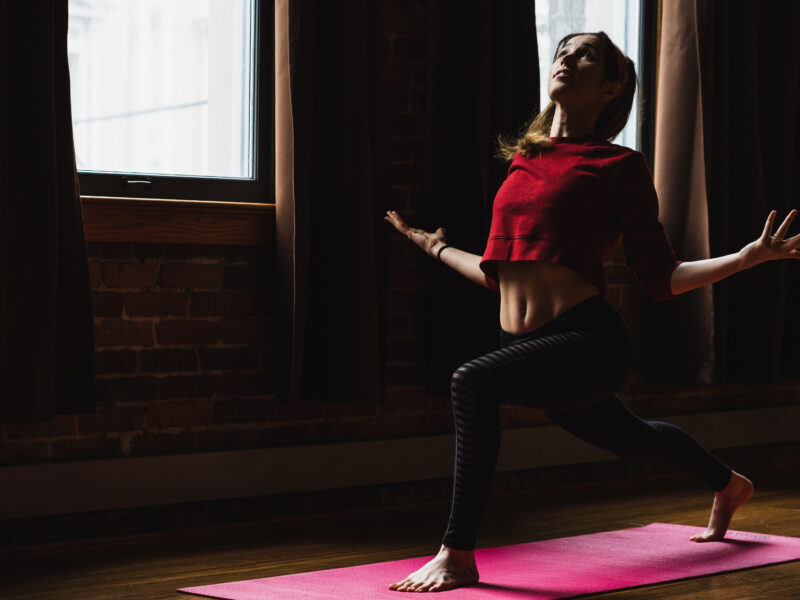When one yoga teacher traveled to Mysore, India, to study Ashtanga yoga for a month, he brought his wife and baby daughter with him. Here’s how the experience became his biggest teacher.

By Ty Landrum
This article was written in 2018.
India is a swarming mass of revelry and confusion. Along with busy people in colorful attire and vehicles of all sizes, you will also find wild dogs, sacred cows and crippled beggars on the streets. Motorcycles brush past you at dangerous speeds, swerving around merchants and sometimes monkeys, then shoot into traffic circles with no rules. Trucks growl, women sing, and prayers rise in sudden discord, as children without shoes kick dust into the heat. You try to breathe, but your throat shrinks.
You have to relinquish your ideas about reason, order, and even basic sanity. Unless you surrender, you risk melting down completely.So, you throw off your ideas and you step into the abyss, allowing yourself to fall. The truly wonderful thing is that you never hit bottom. You just keep falling, gracefully. After a few days, you feel your whole body relax.
Things that appeared threatening when you first arrived now begin to appear benign, and the whole place takes on an unexpected charm. The beggar that stalks you each morning as you step into the street now appears as a friend, welcoming you to give generously. The incessant honking that once grated your nerves now sounds like a kind courtesy.
These changes teach you something about how you process your experience, and how tightly you carry your fears, disgusts, and anxieties. It also teaches you how simple it can be to let go, to relax, and allow yourself to be free. So, when you come to India, there is a process of making peace with the noise, chaos, and grit—and that process can be cathartic and liberating. And when you come with family, especially a little child, the grit with which you formerly made peace suddenly gathers, rises, and mounts a full-scale assault on your nerves. When your baby girl toddles on the Indian streets–one where people spit freely–and then drops to her knees, wiping her feet, and rubbing her hands across her face, you lose weeks, maybe months, from the span of your life.
Sniffles and body aches are simply unavoidable in India. The air is so polluted that it burns your sinuses, and you get a sore throat—with a cough—in a matter of days. Your baby girl gets that cough, too, and those watery eyes look up at you helplessly. You can’t say for sure what the cause is. And until her cough subsides, you quietly hate yourself for bringing her here. And your spouse probably hates you, too.
So, you try to go on a walk to convince yourself that everything is fine. But what keeps coming back to you is this: The streets of India are no place for toddlers. Even Indian women know this, and they keep their babies at home. So, when they see you with your baby, toddling precariously along, they light up. They come over and squeeze her cheeks, sweetly enough. But then they put their fingers on their lips, make a kiss, then stick it back on to your baby’s half-open mouth.
To all young parents who are curious about bringing their small children to Mysore, I say yes, my friends, it is hard. And still, if you want to practice yoga here, the presence of your children will give an untold depth and substance to the endeavor. The kind of surrender that you have to cultivate to get through the day will make your back-bending feel like a soothing respite from the sacrificial fires that are burning for you all day and night outside the yoga shaala.
Our attachments to our children are among the strongest that we will ever form. And when they are threatened, the ego protests, using every resource it has at its disposal. “No one should have to attenuate their attachments to their children,” you start to say. “It is our sacred duty to protect them. And our attachments give that duty its inexorable force.”
But here, as elsewhere, the ego mistakes attachment for love.
Attachment is controlling and possessive. It seizes upon a particular object or image and will not relent. It makes us rigid, anxious, and dogmatic. And where our children are concerned, we become righteous and moralistic as well.
Love, on the other hand, is open, receptive, and endlessly forgiving. It wants nothing for itself, does not judge or moralize, and goes along with surrender effortlessly. It moves us to care for our children, to nurture them, to attend to them closely, but also to give them space for their lives to unfold. However careful we are to protect our children, we cannot shield them from the dangers of the world. Nor should we. They are here, like us, to experience life in full, and that includes sickness and injury. Their life is not ours. It does not belong to us, and we cannot control it. The best we can do is support our children on their unpredictable sojourn in this world. To this end, we can practice being more open, more receptive, more present to our children, through whatever life throws at them. Then we can truly support them, and help their lives be joyful and filled with light, without obstructing the natural flow of things.
 This is the lesson that Mysore held for me this year. I cannot say that I have totally learned it, but I have been contemplating it deeply, and in the process, I have learned much about my own frailty. Among other things, I have seen the shadow side of my concerns for my baby girl’s well-being. I have seen how my fears and anxieties over her safety can interfere with her happiness.
This is the lesson that Mysore held for me this year. I cannot say that I have totally learned it, but I have been contemplating it deeply, and in the process, I have learned much about my own frailty. Among other things, I have seen the shadow side of my concerns for my baby girl’s well-being. I have seen how my fears and anxieties over her safety can interfere with her happiness.
Thanks to the grit of India, I leave with a little more clarity. I know that I cannot spare my daughter from suffering, and I cannot control the course of her life. But I can give her endless love, and I can be present to her suffering when it comes.
Moreover, I can do my best to teach her the only true answer to suffering in this world, which is to love openly, freely, and without fear. My wish for her is resilience, so she can have her heart broken a thousand times, and still have the strength to stand up, dust herself off, and fall in love all over again, with complete abandon.
Thank you, India. Thank you for teaching us so richly, while sparing our little girl from sickness and harm. To our astonishment, she returns with us unscathed. And as for us, we go home licking our wounds, with wonder and gratitude, contemplating this profound lesson that you have given us.
Teacher and model Ty Landrum is director of the Yoga Workshop in Boulder, Colorado, and has a PhD in Philosophy. For more information, go to tylandrum.com.
This article was first published in the print edition of Yoga Journal Singapore, which is now Yogahood online.







